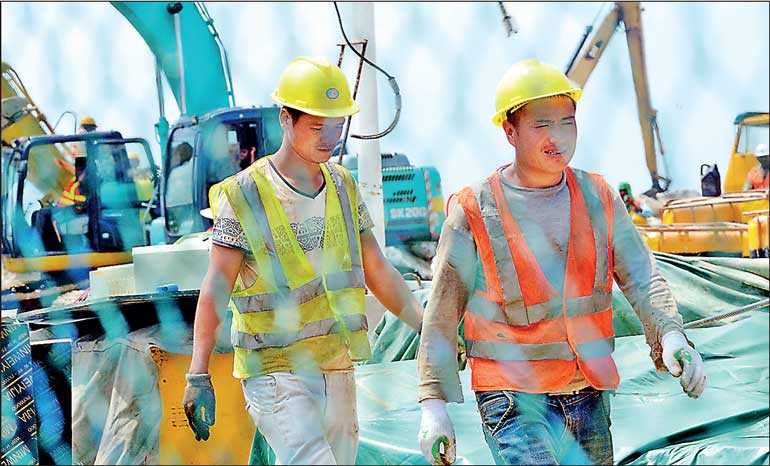Saturday Feb 07, 2026
Saturday Feb 07, 2026
Thursday, 16 May 2019 00:00 - - {{hitsCtrl.values.hits}}

“The available statistics appear to show that, whether the phenomena are connected or not, the rise of prices has nearly been proportional to the increase of currency” 
“Apart from the fluctuations of the seasons the Indian level of prices is most influenced at the present time by the extent to which Europe makes investments there” – J.M. Keynes on India
Why China invests
Keynes wrote an economic journal article studying significant price rises in India in 1909. He statistically looked to see what figures best explain the rise in prices. His paper is difficult to summarise but easy to find online and read for oneself. It puts forth the argument that the ‘rapid influx of foreign capital’ is what caused the inflation of the studied time period.
China by running considerable trade surpluses has built up considerable foreign assets. If China was to repatriate its foreign-held assets it would face severe inflation. It is widely agreed that these trade surpluses accrue due to a large working population being subject to slave-like conditions. This is a fact widely ignored by those Sri Lankans who purport to be considered with the welfare of labour but happily align themselves with China’s foreign interests.
The notion of debt
If history shows anything, it is that there’s no better way to justify relations founded on violence, to make such relations seem moral than by reframing them in the language of debt – above all, because it immediately makes it seem that it’s the victim who’s doing something wrong.” – David Graeber
Whether or not someone owes something to someone else is a judgment steeped in various cultural considerations. This is because debt is more than just a monetary transaction and can take forms that are non-monetary. People, for instance, can lend time or moral support to each other with an expectation that the other party returns the favour.
It is also impacted by role. A parent, for instance, may never be indebted to their child. This is because the nature of the relationship within our culture does not allow for such accounting. Odd situations in terms of economics arise when sometimes people are offered things for free with no explicit strings attached and still refuse them. This can be explained culturally by the fact that accepting such a gift would result in changing the nature of the relationship.
There are also implications with regards to the terms of the debt. If for instance there are stipulations attached to the debt does it still conjure up feelings of indebtedness beyond the monetary value? If China gives money contingent on us using a Chinese contractor and paying back a rate of interest is it really a favour?
The terms that can be enforced also speak a lot to the power balances within society. For instance, our incredibly unequal society manifests itself quite explicitly in the treatment of microfinance borrowers. Monetary debts historically could be passed generationally and also result in indentured servitude.
China supporting our military
During our civil conflict, the Chinese government provided the nation with considerable military equipment, support within international bodies, and financial support to the Government. This all had an undeniable impact in allowing for our military victory. The Chinese government stood with us wherein Western governments that we are currently pivoting to did not.
This friendship was given at a time much needed. The US, on the other hand, attacked Sri Lanka on human rights and the war effort. This is a country which had previously gone as far as to give citizenship to a current presidential hopeful who was involved in the brutal UNP led crackdowns on JVP supporters. The US-UNP relationship probably helped secure citizenship.
The US globally is not a real supporter of democracy. This is true of any superpower. There is no dichotomy between China and the United States. Both nations must be balanced in their influence if Sri Lanka is to prosper.
Responding to propaganda
Recently a very subtle PR campaign is being run pushing the idea that Sri Lankan debt to China is not significant. The argument put forth hinges on the rate of interest and the total holding of debt. Both of which would not place China as a predatory lender. This is in contrast to the deafening silence and lack of gratefulness to India which recently offered Sri Lanka a much-needed line of credit.
An actual think tank should look at the marginal growth in debt as there has been little historical down payment of debt. It is likely that within the Rajapaksa administration Chinese debt and investment would show exponential growth. People trying to politicise a front running scandal in a country wherein that has never been considered a crime must be ignored by the general public.
Providing a sensible view
It is difficult to place a binary distinction between Chinese debt and investment being either good or bad. It, however, is dishonest to absolve China of the negative impacts some of its projects have had on Sri Lanka. The likening of China to a bank and its impact only modulating good or bad policy is overly simplistic and morally repulsive. As put forth in the bestseller Confessions of an Economic Hitman there is a massive role the lender plays in the success or failure of a project.
One only has to look at Norochcholai Power Station or the Hambantota port to see the negative impacts of Chinese investment. More on the Belt and Road initiative can be found on the American Enterprise Institute website. Their China Investment tracker documents broad corruption.
There have been positives of Chinese investment and China invariably has to be a source of finance to the Government. China as mentioned before played a pivotal role in the war victory. Chinese labour is bringing significant efficiency to our construction sector. Every effort should be made to keep them in the country after the completion of the Shangri-La project.
The lie on concessional debt
The narrative put forth by these PR agencies is that Sri Lanka loses its concessional debt privileges around 2004. They suggest this is because Sri Lanka gains middle-income status during this period. Therefore after 2004, Sri Lanka has to go to international markets to finance its development.
This narrative is maliciously untrue and is rarely contested. Sri Lanka on PPP terms might be middle income but is not so in terms of actual dollar income. This is why basic electronics seem so expensive even though we are defined as middle income. Electronics are imported and priced in actual dollar terms.
Further concessionary debt or military aid is not driven by actual need but rather by foreign policy considerations. Israel, for instance, is a major recipient of US defence aid. As we near an election Sri Lanka is also receiving considerable US/NATO linked aid. This aid is not tied to any specific project and can be spent in conjunction with the upcoming monetary stimulus to boost the economy.
The north and east of the country are also the focus of many good Samaritans. The international community needs to promote projects in the area to seem sincere in their views at the UN. These projects, however, need to be free from corruption so as to meet the internal policy requirements of the funding agency and this was not possible in the previous regime.
The executive presidency in all of this
It is a poorly kept secret that the leaders of the two major political parties are going to support the abolishment of the executive presidency. It is only the gullible and the news cycle hungry journalists that are pushing a narrative that sees the two gentlemen passing political power either to their former leadership rivals or their siblings. The conspiracy theories have gone so far as to involve the recent defeat of expenditure heads.
The political manoeuvring required to bring the constitutional amendment to pass still requires finesse but is the most likely outcome given the current balance of interests and power.
The executive presidency is important in this as it is an office that can unilaterally change the foreign policy of the country. JRJ notably pivoted Sri Lanka’s foreign policy to the US and placed the nation on the global map. The President’s office under Rajapaksa pivoted heavily towards China and greatly diminished our global standing.
This President’s actions allow for the acceptance of debt and obligation to other nation states. As foreign policy can be dictated by the executive it also has a military implication with regards to allegiance. Allegiance pays a huge role in debt as it has a huge trust element built into it. It’s the same reason that Catholic banks so readily lend to Catholics. They fear the same God.
Sri Lanka’s small size but the important maritime location will always mean that it will be of interest to global powers. If the acceptance of debt or international military corporation is moved closer to Parliament it is more likely that these arrangements benefit the general populace.
The reason Sri Lanka as a nation does not feel indebted to China is because they feel such debt was negotiated by the former strongman in benefit of his extended family. This is why one must analyse the growth in debt and implications on debt of Chinese projects to have a broader understanding of the large mistrust of Chinese influence amongst our people.
Conclusion
We as civil society must look at things like grace periods and benchmark costs against international standards when assessing projects. Construction companies should also be able to make a profit. The Hambantota port, for instance, put the ports authority into a significant cash flow problem. The local partnership model put forth in the recent budget is an economic policy that is agreeable to the majority of the voting population.
Most Sri Lankans do not feel a major debt to China. The Chinese only help as they need to reinvest their foreign proceeds and gain regional influence in line with the interests of an emerging superpower.
We, however, do have an obligation to wherever possible offer refuge to those who are politically persecuted. Sri Lanka is in a net debt position to the world who accepted its citizens when they were facing persecution domestically following two incredibly destructive changes to its constitution. We owe it to the world to give the Chinese freedom from communism. Port City can be their refuge.
References:
Recent Economic Events in India pg. 57 Author(s): J.M. Keynes Source: The Economic Journal, Vol. 19, No. 73 (Mar., 1909), pp. 51-67
Recent Economic Events in India pg67 Author(s): J.M. Keynes Source: The Economic Journal, Vol. 19, No. 73 (Mar., 1909), pp. 51-67
https://www.forbes.com/sites/kenrapoza/2014/04/07/chinas-foreign-assets-more-than-half-its-gdp/#6c5b34d731ea
https://thediplomat.com/2018/03/chinas-forced-labor-problem/
Debt: The First 5,000 Years
https://www.independent.co.uk/news/world/asia/how-beijing-won-sri-lankas-civil-war-1980492.html
https://www.veriteresearch.org/2019/01/16/chinese-debt-is-not-sri-lankas-biggest-problem-verite-research/
http://www.colombopage.com/archive_19A/Jan09_1547042503CH.php
http://www.aei.org/china-global-investment-tracker/
https://www.japantimes.co.jp/opinion/2009/03/04/commentary/china-fuels-sri-lankan-war/#.XIZ7z9JS82w
http://www.ips.lk/talkingeconomics/2019/01/22/managing-sri-lanka-china-economic-relations-bri-debt-and-diplomacy/
https://www.theatlantic.com/international/archive/2016/09/united-states-israel-memorandum-of-understanding-military-aid/500192/
http://www.dailynews.lk/2019/03/18/business/180538/world-bank-provide-usd-70-mn-rural-development
https://reliefweb.int/report/sri-lanka/human-rights-must-be-top-priority-economic-reforms-says-un-expert
http://www.dailymirror.lk/political-gossip/A-mystery-shrouded-dialogue-/261-164949
https://twitter.com/sunandadesh/status/1111526682710691841
http://www.sundaytimes.lk/110213/Timestwo/t2_14.html
http://www.island.lk/2009/09/07/features2.html
https://www.youtube.com/watch?v=9gL5stPqdHo